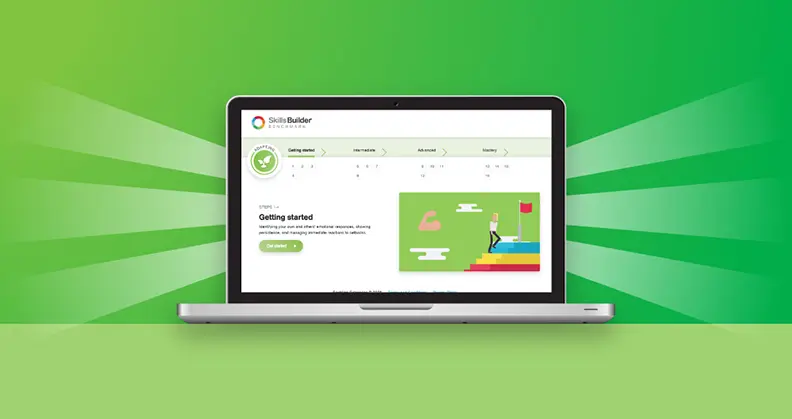Context for our work with trailblazing employers
Employers are facing challenges on several fronts when it comes to their workforces: recruiting skilled candidates and retaining talent while improving productivity.
Rising inflation, a squeezed labour market, and hybrid forms of work are leading employers to consider novel ways to attract and retain talent, with many struggling to address skill shortages in their workforce and talent pools. Indeed, according to research from McKinsey, “the need to address skill gaps is more urgent than ever”: these employers must equip their staff with high levels of transferable essential skills, such as problem solving and teamwork, to redeploy them to new roles and plug skills gaps.
The power of essential skills lies in their universal applicability across sectors, roles, ages and even education and outreach - and it’s therefore no surprise that they’re in strong demand from both employers and employees. Recent research, the Essential Skills Tracker, found that 89% of working age adults in the UK believe essential skills to be important for employment, career progression, or success in recruitment. 83% would like more opportunities to build essential skills and 92% believe they should form part of professional development. However, only 14% of working professionals reported having received formal opportunities to build them at work.
Many employers want expert advice and tools to optimise their implementation. That’s why we developed a structured programme for employers: the Skills Builder Employer Programme.
We work together to create a tailored strategy to embed and use the Skills Builder Universal Framework for essential skills to achieve excellence in essential skills development across recruitment, staff development, and outreach.
Achieving high standards in these areas is recognised via Excellence Marks, which we award to businesses to enable them to easily communicate their best practices.
The Trailblazers Report draws on our national research with YouGov and surveys and case studies with pioneering employers and employees who have leveraged this rigorous approach to tackle problems within their organisation. It brings you practical insights on how and why to build essential skills into your business.
Let’s jump right into what we found out.
Recruitment: Hiring employees with essential skills
Lots of progress has been made to reduce bias in recruitment and build diverse teams - but more can be done. Decisions involve multiple stakeholders, making results variable and unpredictable. In addition, though many organisations now assess candidates’ essential skills (as opposed to just experience or qualifications), widening their talent pool, these skills are often poorly defined. It’s hard to know ‘what good looks like’ and assess candidates robustly and transparently.
“We used to have a scoring system using numbers – but that was so subjective.” HR Business Partner, AKW
Employers that provide transparency, resources, and learning through the recruitment process not only improve the candidate experience, but create fairer, more effective, and more diverse recruitment:
- Embedding the Skills Builder approach and Universal Framework into recruitment practices drove a 23% improvement in employers being able to recruit candidates with the skills they need. This was due in part to a 29% improvement in employers’ confidence at identifying skills in the recruitment process.
- 75% of employers felt candidates’ essential skills were stronger following the updated recruitment process and had more confidence in applying the skills.
- 75% of employers also reported that their recruitment processes were inclusive because the essential skills were clearly explained, with a 5% improvement in the ability to recruit diverse candidates.
Learning & development: Building employees’ essential skills
The vast majority of employees want to build essential skills for their professional development. Likewise, employers agree that these skills boost productivity and staff wellbeing, and seek a tangible way to measure employees’ progress in them.
“Essential skills are very important in my role because I need to be able to motivate people from across the organisation to be involved in different projects and opportunities, being most of the time extra activities in their day to day.” Employee, HS2
The Universal Framework provides structure and clarity by breaking each skill into measurable steps. Using the same Framework for essential skills within both recruitment and staff development helps join the two processes up:
- 89% of employees who were provided with the Universal Framework for essential skills in staff development believe that the structured approach improved their performance, with 75% feeling more engaged in their work. All those surveyed said they wanted to continue with more opportunities to use the Framework.
- 75% of these employees reported an improvement in their essential skill levels. 63% of this improvement was attributed to having a coherent Universal Framework that built awareness and confidence.
- 67% of these employees’ managers and talent teams also reported that, after only 6 months, team performance improved thanks to building essential skills using the Skills Builder approach.
Outreach: Effective programmes that build skills
Employers running social impact programmes often aim to build a range of skills and knowledge, but find it difficult to do this in a way that’s both relevant for their beneficiaries and for ensuring they have a diverse, skilled workforce to recruit from in the future. Another hurdle is targeting learning effectively, and evaluating the programme’s impact.
Our research showed that people who build essential skills early on seek out further opportunities to build them, and enter higher skilled, higher paid jobs. By widening access to opportunities for young people to build transferable essential skills, and by using a Universal Framework that spans the entire career spectrum, employers are futureproofing our workforce with skills to succeed in roles that may not exist yet:
- Embedding the Universal Framework into outreach drove a 17% increase in CSR professionals reporting that their programmes effectively build essential skills, with 100% reporting that it improved their programmes’ impact.
- Employers using Skills Builder Benchmark to measure pre- and post- programme essential skill levels have seen participants improve rapidly. 98% of participants achieved demonstrable, significant progress in essential skills.
- 83% of employees and volunteers working on the programmes also developed their own skills through using the Framework, and all reported a better understanding of these skills.
“Without good transferable skills, I wouldn’t have been able to completely change careers, demonstrate my strengths, have someone take a chance on me, and get into stable employment.” Amber, Kickstart Participant
Read the report and find out how you can get involved
The full report and case studies from each employer are available over at this link.
If you’d like to learn more about how our Employer Programme can help you to develop your workforce’s essential skills, head to our webpage and book a consultation or download a prospectus.






